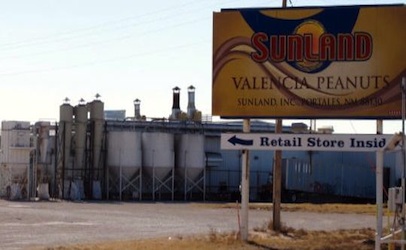 Federal court records show that the Oct. 8 bankruptcy filing by the nation's largest organic peanut butter processor was sparked by Issaquah, WA-based Costco, a membership-based warehouse club, when it unilaterally terminated a deal it had with Portales, NM-based Sunland, Inc.
Federal court records show that the Oct. 8 bankruptcy filing by the nation's largest organic peanut butter processor was sparked by Issaquah, WA-based Costco, a membership-based warehouse club, when it unilaterally terminated a deal it had with Portales, NM-based Sunland, Inc.
It's left a side dispute for the U.S. Bankruptcy Court for New Mexico to figure out. Costco wants to take possession of $20 million worth of peanuts currently in storage at Sunland, and Sunland wants Costco to pay it $4 million for previously delivered shelled and bagged peanuts and for finished peanut butter, also in storage.
U.S. Bankruptcy Court Judge David Thuma has scheduled a Dec. 23 hearing to resolve the dispute. If Costco gets to take possession of the peanuts, it would reduce Sunland's assets available to be divided up by other creditors, including employees who were stiffed when Sunland shut down.
Costco's role in turning Sunland's plans for a Chapter 11 (reorganization) bankruptcy filing into a Chapter 7 (liquidation) is found in the court filings. Sunland began planning as early as April 2012 for a possible reorganization, which would have allowed it to continue operations like airlines often do.
In 2012, an outbreak of Salmonella Bredeney infections of 42 people in 20 states was linked to peanut butter manufactured by Sunland. The U.S Food and Drug Administration (FDA) temporarily suspended Sunland's federal registration, forcing it to cease operations for about four months in late 2012 and early 2013.
It was during the FDA-induced shutdown that Costco agreed to front Sunland the cash to continue buying peanuts under a Dec. 4, 2012, deal between the two companies. But about 10 months later, on Oct. 4, 2013, Costco pulled out, and, just four days later, Sunland filed for Chapter 7 liquidation.
Before it pulled out of the deal, however, Costco put up $7.5 million in December and another $12.5 million in February, funding a total of about 29 million pounds of peanuts and keeping the market going for raw, unshelled Valencia peanuts. Money was deposited into escrow accounts that apparently could be tapped by growers as the peanuts were processed.
Costco, often seen as a corporate leader in food safety, remains among Sunland's top three creditors. The other two are CoBank and the Production Credit Association, both part of the federal farm credit system. Cobank participated in the Costco peanut purchases by taking a secondary position in the deal.
The complete meltdown of the nation's largest organic peanut processor initially caught the Portales community by surprise, even to employees who shut the doors without getting their last paycheck. Surprise turned to anger when they learned the bankruptcy had been in the works since April, and the company even took $150,000 from a local economic development fund after it decided to file for bankruptcy.
Sunland's officers never mentioned bankruptcy as a possibility in their discussions with the Portales economic development program. The Portales City Council is looking into how the town might get its money back.
Costco cash was used to purchased peanuts last December and February, in part to keep payments flowing to Valencia peanut growers along the West Texas/New Mexico border region.
About 75 Sunland employees went without a final paycheck in amounts ranging from $100 to about $1,000 each. Employee payments typically are considered as priority claims against the assets of a business being liquidated.
Thuma has granted the bankruptcy trustee, Clarke Coil, the power to reopen Sunland's Portales plant if it is needed to process peanuts, some of which are not held long-term in cold storage. Any reopening would be on a limited basis for the purpose of preserving assets. Some workers might get called back for temporary duty.
Sunland's problems began with the recall of Trader Joe's Organic Valencia Peanut Butter, which was produced by the New Mexico company and found to be contaminated. With the outbreak, the recall expanded to include dozens of its other brands.
Also the largest organic peanut butter exporter in the U.S., Sunland was the largest private-sector employee in Portales, an eastern New Mexico community of about 20,000.
